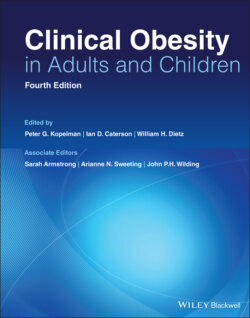Читать книгу Clinical Obesity in Adults and Children - Группа авторов - Страница 100
Internalization
ОглавлениеIn comparison to studies assessing the effects of weight stigma enacted by others, the health impact of internalized weight stigma (or weight bias internalization; WBI) has received less empirical attention, and most studies on this topic have been published in the last 5 years [99]. However, a recent systematic review identified over 70 empirical studies that assessed associations between WBI – primarily measured with the Weight Bias Internalization Scale or the Weight Self‐Stigma Questionnaire [9,100] – and mental and physical health outcomes [99]. The review found robust associations between WBI and measures of psychological well‐being such as depression, anxiety, body dissatisfaction, binge eating, poor self‐esteem, reduced mental health‐related quality of life (HRQOL), and general psychological distress. Some studies have found that WBI mediates or moderates the relationship between experiencing weight stigma and unhealthy behaviors (e.g. uncontrolled or emotional eating), highlighting that the internalization process may facilitate poorer outcomes for people who have encountered weight stigma from others [101–103]. Notably, WBI may also operate independently from experiences of weight stigma (for example, if people internalize societal weight attitudes without having direct, stigmatizing encounters).
Associations between WBI and physical health outcomes have been more mixed, with some studies showing that WBI is associated with poorer physical HRQOL, higher BMI, and less reported minutes of physical activity, and other studies finding no significant relationships [99]. WBI does appear to be more consistently associated with motivational factors, such as reduced reported self‐efficacy to engage in healthy eating and physical activity and greater reported avoidance of activity. However, few studies have included objective measures of physical activity, so it remains unclear how WBI may or may not impact this health behavior.
In general, most studies examining WBI and physical health have relied solely on self‐reported health measures, with the exception of some studies that include measured BMI. Recent efforts have been made to expand WBI research to include more objective measures of health. For example, one study found an association between heightened WBI and the presence of metabolic syndrome, with a particularly strong relationship between WBI and high triglycerides [104]. Another study measured salivary cortisol before and after an acute social stressor and found that individuals with high WBI showed an abnormally blunted HPA axis response to the stressor [105]. More research is needed to determine whether internalizing weight stigma may elicit a similar stress response and associated chronic diseases as those observed in relation to perceived weight discrimination.
Recent research has also focused on the impact of WBI on weight management efforts. Studies have shown that individuals with higher levels of WBI are more likely to report “dieting” than those with lower WBI, and WBI tends to be higher in treatment‐seeking samples than in community samples of individuals with obesity [99]. Patients with higher WBI may also be at risk for poorer long‐term weight loss and maintenance [106–111]. For example, a study of 170 patients undergoing bariatric surgery found that higher baseline WBI was associated with less weight loss one year later after controlling for depression, surgery type, BMI, and demographic characteristics [106]. The relationship between WBI and weight loss has not been consistent: some studies do not show these associations, and in others, the associations are only significant for certain subgroups, on select subscales, or at some but not all timepoints. Other studies have found that, among patients enrolled in weight management programs, those with high levels of WBI show attenuated improvements in eating and physical activity compared to those with lower WBI [112,113]. Weight loss interventions produce statistically significant but modest reductions in WBI, suggesting that weight loss on its own may not be sufficient to diminish deeply internalized, self‐disparaging beliefs about oneself due to weight [109,112]. Greater attention is due to the potential impact of WBI, and to reductions in WBI, on weight management efforts.
